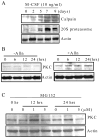Differentiation-Associated Expression of Conventional Protein Kinase C Isoforms in Primary Cultures of Bone Marrow Cells Induced by M-CSF and G-CSF
- PMID: 20535245
- PMCID: PMC2882317
- DOI: 10.5099/aj090100047
Differentiation-Associated Expression of Conventional Protein Kinase C Isoforms in Primary Cultures of Bone Marrow Cells Induced by M-CSF and G-CSF
Abstract
The Protein kinase C (PKC) -associated signal pathway plays crucial roles in regulation of cell growth, differentiation and apoptosis. The present study focuses on conventional PKC (cPKC) expression and its regulation in primary cultures of bone marrow cells induced to undergo macrophage/granulocyte differentiation by macrophage colony-stimulating factor (M-CSF) or granular colony-stimulating factor (G-CSF). By performing western blot analysis with pan anti-PKC antibodies, we found that PKC is transiently induced by M-CSF, reaching a maximum level by day 2, and then declines and diminishes by day 9 in primary culture of bone marrow cells. In contrast, the expression of PKC along G-CSF induced granulocytic differentiation of bone marrow stem cells is low and increases gradually. Reverse transcription-PCR (RT-PCR) assay was utilized to investigate the expression of PKC isoforms. PKC-alpha is constitutively expressed in bone marrow cells independently of hematopoietic growth factors in cultures. PKC-gamma mRNA is undetectable. Similarly, the expression of PKC-beta is transiently induced by M-CSF, yet steadily increased by G-CSF, in agreement with results obtained from PKC protein expression. Furthermore, gel-shift assay showed that the activation of NF-kappaB is transiently induced by M-CSF but not by G-CSF. These data suggest that PKC expression is involved in both macrophage and granulocyte differentiation by bone marrow committed stem cells. Yet, NF-kappaB activation is only detected in macrophage and not granulocyte differentiation. Thus, we conclude that the PKC-mediated signaling pathway is distinctly involved in bone-marrow cell differentiation induced by M-CSF and G-CSF.
Figures



Similar articles
-
Cytokine-mediated protein kinase C activation is a signal for lineage determination in bipotential granulocyte macrophage colony-forming cells.J Cell Biol. 1994 May;125(3):651-9. doi: 10.1083/jcb.125.3.651. J Cell Biol. 1994. PMID: 7513707 Free PMC article.
-
Role of protein kinase C in expression of granulocyte-colony stimulating factor and granulocyte macrophage-colony stimulating factor in lung cancer cells.Int J Mol Med. 2005 Nov;16(5):873-81. Int J Mol Med. 2005. PMID: 16211258
-
Differential regulation of fyn-associated protein tyrosine kinase activity by macrophage colony-stimulating factor (M-CSF) and granulocyte-macrophage colony-stimulating factor (GM-CSF).J Leukoc Biol. 1995 Mar;57(3):484-90. doi: 10.1002/jlb.57.3.484. J Leukoc Biol. 1995. PMID: 7884321
-
PLCγ2 and PKC are important to myeloid lineage commitment triggered by M-SCF and G-CSF.J Cell Biochem. 2014 Jan;115(1):42-51. doi: 10.1002/jcb.24653. J Cell Biochem. 2014. PMID: 24038146
-
Protein kinase C-alpha isoform is involved in erythropoietin-induced erythroid differentiation of CD34(+) progenitor cells from human bone marrow.Blood. 2000 Jan 15;95(2):510-8. Blood. 2000. PMID: 10627456
Cited by
-
Histone Deacetylase Inhibitor M344 Inhibits Cell Proliferation and Induces Apoptosis in Human THP-1 Leukemia Cells.Am J Biomed Sci. 2009 Jun 9;1(4):352-363. doi: 10.5099/aj090400352. Am J Biomed Sci. 2009. PMID: 20526416 Free PMC article.
References
-
- Tamura T, et al. FMIP, a novel Fms-interacting protein, affects granulocyte/macrophage differentiation. Oncogene. 1999;18(47):6488–95. - PubMed
-
- Sherr CJ, et al. The c-fms proto-oncogene product is related to the receptor for the mononuclear phagocyte growth factor, CSF-1. Cell. 1985;41(3):665–76. - PubMed
-
- Hamilton JA. CSF-1 signal transduction. J Leukoc Biol. 1997;62(2):145–55. - PubMed
-
- Lin H, et al. Activation of the MEK/MAPK pathway is involved in bryostatin1-induced monocytic differenciation and up-regulation of X-linked inhibitor of apoptosis protein. Exp Cell Res. 2002;272(2):192–8. - PubMed
Grants and funding
LinkOut - more resources
Full Text Sources
Research Materials
